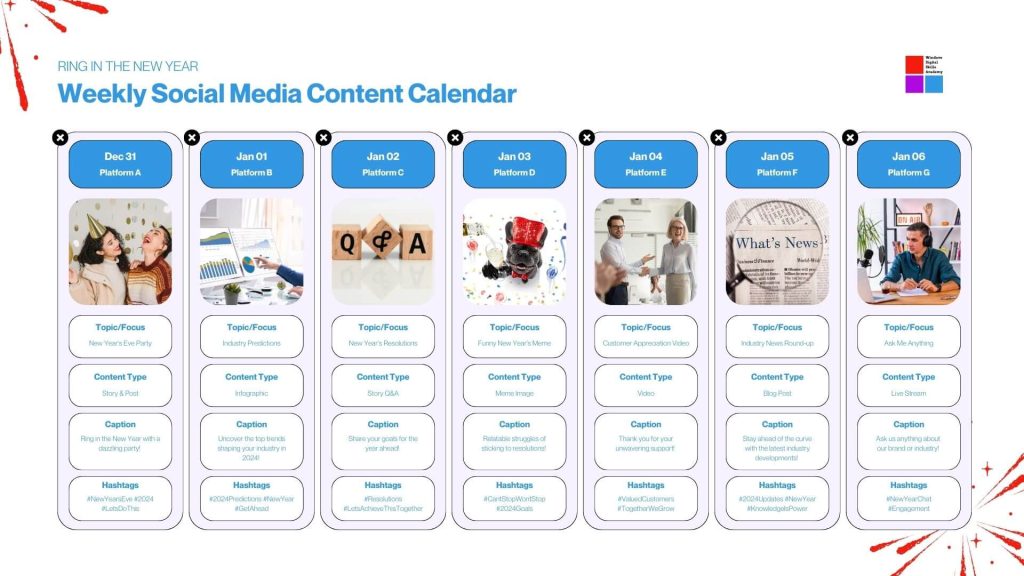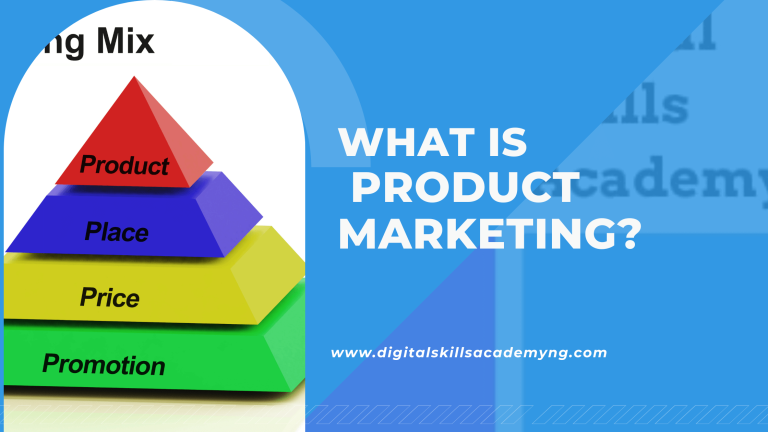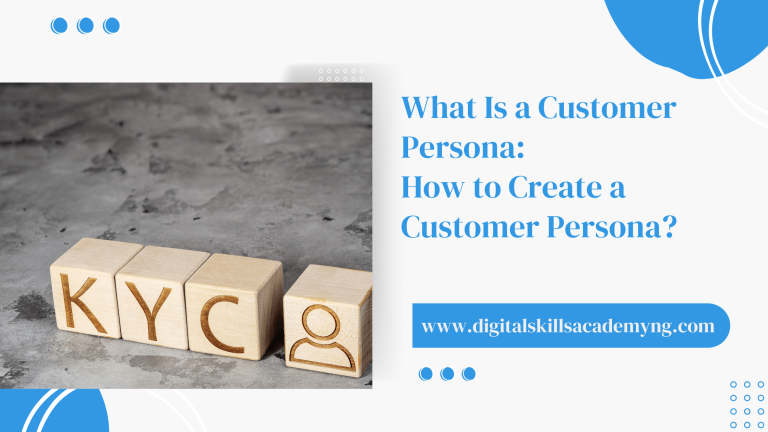How to Create a Social Media Plan
Creating a social media plan is essential for any business that wants to harness the power of digital marketing.
In today’s connected world, small businesses and entrepreneurs can benefit immensely from a strategic approach to social media.
Whether you’re just starting or looking to fine-tune your strategy, a well-crafted social media plan can guide you in reaching and engaging your target audience more effectively.
START YOUR DIGITAL MARKETING JOURNEY TODAY!
Table of Contents
What is a Social Media Plan?
A social media plan is a detailed blueprint that outlines how a business or brand will use social media channels to achieve its marketing goals.
It encompasses everything from setting objectives and choosing platforms to defining your content and engagement strategies.
The purpose of a social media plan is to keep efforts consistent, organized, and aligned with business objectives, whether they include building brand awareness, driving website traffic, or generating leads.
An effective social media plan typically includes:
- Clear goals and objectives aligned with business goals
- Audience research to understand what resonates with your target demographic
- Content creation guidelines for engaging, relevant posts
- Posting schedules for consistency
- Monitoring and engagement strategies to interact with followers
- Analytics and performance tracking to evaluate and refine the plan
10 Tips for Creating a Social Media Plan
Define Your Goals
Set SMART (Specific, Measurable, Achievable, Relevant, Time-bound) goals.
For instance, a goal might be to “increase engagement by 20% on Instagram in three months.”
Clear goals give your team direction and help evaluate your success.
Know Your Audience
Identify your target audience based on demographics, interests, and behaviors.
Each social platform has its unique user base; knowing who they are helps tailor your message to the right people, resulting in better engagement and conversions.
Choose the Right Platforms
Avoid spreading yourself too thin by selecting platforms where your audience is most active.
For instance,
- LinkedIn is ideal for B2B
- Instagram works well for lifestyle and e-commerce brands, and
- TikTok appeals to younger audiences.
Perform a Competitor Analysis
Study your competitors’ social media presence to identify what works and what doesn’t. Look at their content types, posting frequency, engagement rate, and audience feedback to gain insights and inspiration.
Develop a Content Calendar
Planning posts in advance helps ensure consistent and diverse content.
A content calendar allows you to balance promotional posts with informational and entertaining content that engages your audience.

Create Compelling Content
Your content should be visually appealing, engaging, and valuable to your audience.
Use a mix of formats such as; images, videos, stories, and live streams to capture interest and build engagement.
Use Hashtags Strategically
Hashtags help increase the reach of your content on platforms like Instagram, LinkedIn, and Twitter.
Research relevant hashtags in your niche and include them strategically without overcrowding your posts.
Engage Consistently with Your Audience
Social media is a two-way street. Respond to comments, engage with followers’ posts, and use polls or Q&A features to involve your audience.
This builds loyalty and encourages followers to interact with your brand.
Track and Analyze Performance
Most platforms offer analytics tools that show how posts are performing.
Track metrics like engagement rate, follower growth, website clicks, and reach. Use this data to adjust your strategy and focus on what’s working.
Refine and Improve Regularly
Social media trends change rapidly, so be prepared to adapt your plan based on performance data and evolving trends.
Regularly reviewing your plan helps you stay relevant and maintain audience interest.
Social Media Planning Tools
There are numerous tools available to help with social media planning and scheduling, some of the most popular include:
Hootsuite:
Hootsuite is an all-in-one social media management tool that allows you to schedule posts, track analytics, and monitor different social channels from a single dashboard.
Buffer:
Buffer offers easy-to-use scheduling, analytics, and team collaboration features.
It’s great for small businesses and solopreneurs who need a straightforward tool to plan and publish posts.
Sprout Social:
Known for its in-depth analytics and reporting capabilities, Sprout Social is ideal for those looking to dive deep into social data and audience insights.
Trello:
Trello is a project management tool that’s also useful for organizing social media content.
It allows you to create boards, cards, and checklists to keep track of your content ideas and posting schedule.
Canva:
Canva is a graphic design tool that helps you create visually stunning content.
It offers customizable templates for various social platforms, so you don’t need design expertise to produce professional-quality posts.
Later:
Specifically designed for Instagram, Later lets you schedule and preview posts, and also offers a “link in bio” feature for driving traffic from your Instagram profile.
Benefits of a Social Media Plan for Small Businesses
Enhanced Brand Awareness
With a structured plan, you can consistently post content that resonates with your target audience, increasing brand visibility and attracting more followers.
Improved Audience Engagement
A social media plan allows you to interact with your audience at the right times and in the right way, strengthening relationships and building a loyal customer base.
Cost-Efficient Marketing
Social media platforms offer one of the most cost-effective ways to promote a business. With a clear plan, you can make the most of your budget utilizing organic and paid strategies.
Data-Driven Decision-Making
You gain insights into what works and what doesn’t by tracking social media metrics. This data helps refine your strategy, ensuring you spend resources on tactics that bring the best results.
Time Management
Planning content saves time and allows you to focus on other aspects of your business. Scheduling posts also ensure you maintain consistency, a critical factor for audience retention.
Competitive Advantage
Many small businesses either lack a social media strategy or approach it haphazardly. A structured social media plan can set your business apart by giving you a competitive edge in your industry.
Increased Website Traffic
Social media platforms can be powerful drivers of website traffic. With a focused strategy, you can guide users to your website, product pages, or blog, increasing the likelihood of conversions.
Better Customer Insights
Through engagement, social listening, and analytics, social media allows you to understand your audience’s preferences, challenges, and interests, providing valuable insights for product development and customer service.
Boosted Sales and Revenue
Social media platforms offer numerous tools, like shoppable posts, that allow small businesses to convert followers into customers.
A well-planned strategy amplifies your reach, resulting in increased sales opportunities.
Greater Flexibility and Agility
A social media plan keeps your strategy organized but flexible enough to quickly adapt to new trends, challenges, or opportunities as they arise.
Conclusion
Creating a social media plan is one of the best investments to boost your brand presence and drive business growth.
For small businesses especially, having a structured plan can make a significant difference in reaching new customers, building relationships, and achieving financial goals.
You can create a robust social media strategy by following these tips, using the right tools, and understanding the advantages.
Ready to take your social media knowledge to the next level?
Sign up for our digital marketing course and master the art of social media marketing!
Learn powerful strategies, from content creation to engagement and analytics, to grow your brand effectively.
Don’t miss the opportunity to build a strategy to transform your business.




